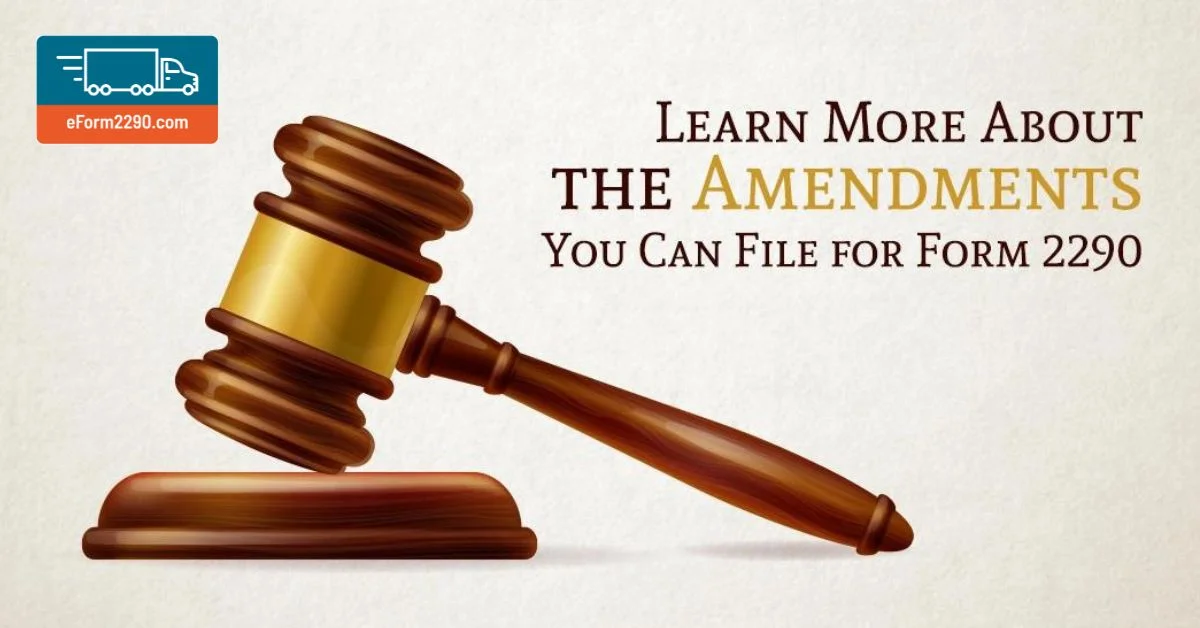Learn More About the Amendments You Can File for Form 2290

The tax code is a very long and complicated piece of information. Since there are so many different requirements and rules, there is always the possibility of errors occurring when filing them. If you are in the trucking industry or your business uses a heavy-weight vehicle, then you have to File Form 2290.
The IRS is extremely strict when it comes to processing your form 2290. Since they have thorough verification processes in place, you want to make sure you are submitting the correct information with no errors. But, we are human and mistakes can happen.
When you submit the 2290 Tax Form, there are a number of reasons that it can get rejected. One of these mistakes include submitting the wrong VIN number. If this happens, you can file an amended return.
Since the trucking industry has specific details about your vehicle that needs to be reported, you sometimes end up having to file an amendment to report certain changes. For example, If your heavy weight vehicle throughout the tax year changes, it means you now have to file an amendment.
Remember that an amendment also comes with its own rules and regulations. So, what are the different types of amendments you can file for Form 2290?


What is Form 2290?
If you own a heavy vehicle weighing 55,000 pounds or more and has crossed 5,000 miles in a a given tax year, you are required to file form 2290 and pay the HVUT Tax (Heavy Vehicle Use Tax).
If your vehicle has not crossed the 5,000 miles (7,500 for agricultural vehicles) for the tax year, then you can file your vehicle as ‘tax suspended’ as you don’t need to pay tax for it. But, once your vehicle exceeds the mileage threshold, then it is time to pay the taxes.
The last day to file your form 2290 is August 31st of every year. Failure to do this will result in penalties. This type of form is mandated by the IRS so that all businesses are in compliance with the law. This truck tax also goes by many different names such as HVUT, heavy highway tax, truck tax, and more.
There are also a number of groups that are exempt from paying the HVUT tax:
- Qualified QSub (treated as a subsidiary of the parent corporation)
- Eligible single-owner disregarded entity (a business that remains independent from its owner for tax filing purposes)
- Taxable vehicle with dual registration
- Vehicle operated under a dealer's tag, license, or permit
- Logging vehicles exclusively intended for the transportation of products harvested from forested sites, such as timber
- A vehicle that is owned and operated by the Federal Government.
- A vehicle that is owned and operated by the District of Columbia
- Vehicles owned by the local governing authority or the State.
- Fire trucks, ambulances, rescue vehicles and vehicles used for other emergencies services
- Vehicles used for the welfare of Indian Tribal Community
- Vehicles specifically designed for non-transport purposes
- Vehicles that do not use highway for transportation
Not only are certain groups exempt, but also certain vehicles are exempt:
- Heavy weight vehicles traveling less than 5,000 miles
- Agricultural vehicles traveling less than 7,500 miles
- Heavy vehicles that are not considered highway vehicles. These types of vehicles are not used for transportation purposes or can be designed for off-highway use.
Even if your group of vehicles fall under one of these categories, you may still be required to file Form 2290 to show that you are exempt. If your heavy weight vehicle has gone through some changes during the tax year, you may want to file an amendment. Here are the three different amendments you can file:


VIN Correction
One of the most common mistakes to make is writing down the wrong VIN number. It is a lengthy number that can cause a typo which would then result in your 2290 Tax Form being rejected by the IRS.
The correction is simple: file a 2290 amendment with the correct VIN number. But there are some restrictions to this:
- VIN correction can only be done for vehicles that are taxable
- Vehicles that were suspended the prior year cannot accept a VIN correction
- You are unable to make credit claims on the amended form
For further questions about filing an amendment for a VIN corrections, give us a call today or fill out our contact form. We’ll make it as stress-free as possible for you.
Increase in Taxable Gross Weight
During the tax period, it is possible that the gross weight of your highway motor vehicle increases. If this happens, you need to update your information with the IRS. The gross weight of the vehicle is determined when it is unloaded but fully equipped.
If the weight of the vehicle increases, then it’s possible that it now falls into a new weight category. The amount that you are taxed will also change depending on your vehicle’s taxable weight category. When you report the increase in gross weight, you will also need to indicate the month that the gross weight changed.
When the weight changes, it is best to do it right away. You will have a timeframe in which you can file the amendment, which is a month after the reported change. For example, if the weight changed in May, then you will have until June 31st to report the gross weight increase.
If your vehicle is less than 55,000 pounds, then you do not have to pay taxes but it may still need to be reported. But if it is between 55,000 and 75,000 pounds then there are different categories it can fall into. Category A starts at 55,000 and changes with every thousand pounds gained.
But how exactly is the taxable gross weight determined? It is a combination of:
- The unloaded weight of the of the vehicle when it is full equipped for services
- The unloaded weight of any full equipped semi trailers that are used in combination with the vehicle
- The maximum weight the vehicle can carry. This also includes the semi trailer if it is being used in combination for transportation.
Suspended Vehicle Exceeds Mileage Limit
If your heavy vehicle is suspended, that means that it has traveled less than 5,000 miles in a tax year. Once your vehicle goes above 5,000 miles, it becomes taxable and you need to report it by filing a 2290 amendment. For agricultural vehicles, the taxable gross weight starts at 7,500 pounds. Since the mileage limit is much higher for these types of vehicles, they are much more likely to be filed as tax-suspended.
The mileage limit refers to the amount of miles the vehicle has been driven on the road regardless of how many drivers it has had. Once the vehicle goes over the mileage limit, it is best to file the amendment right away. You will have until the last day of the following month to file.
Now that you understand the different amendments you can file when you own a heavy vehicle, you should never hesitate to file if anything changes. By filing an amendment for the 2290 Tax Form, you are ensuring that you are following the tax code properly. This will keep you out of trouble with the IRS.
If you are ready to file an amendment for VIN correction, a change in gross weight, or declare your vehicle tax suspended, then visit www.eForm2290.com today! We have guides that help you efile and paper file any of the above amendments. We even have 24/7 customer support if you have any questions or need assistance with your filing process. Taxes can be tricky and we are here to make sure you get it right!